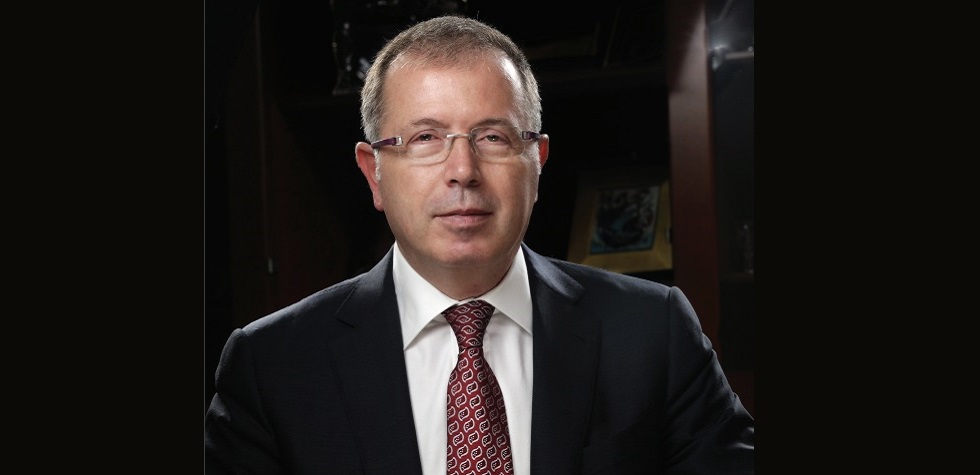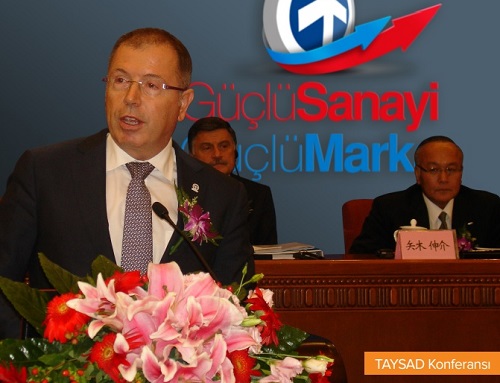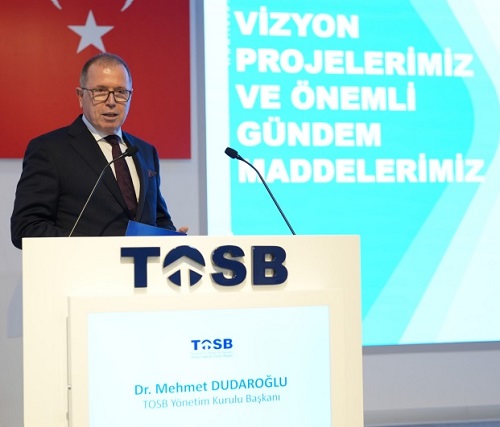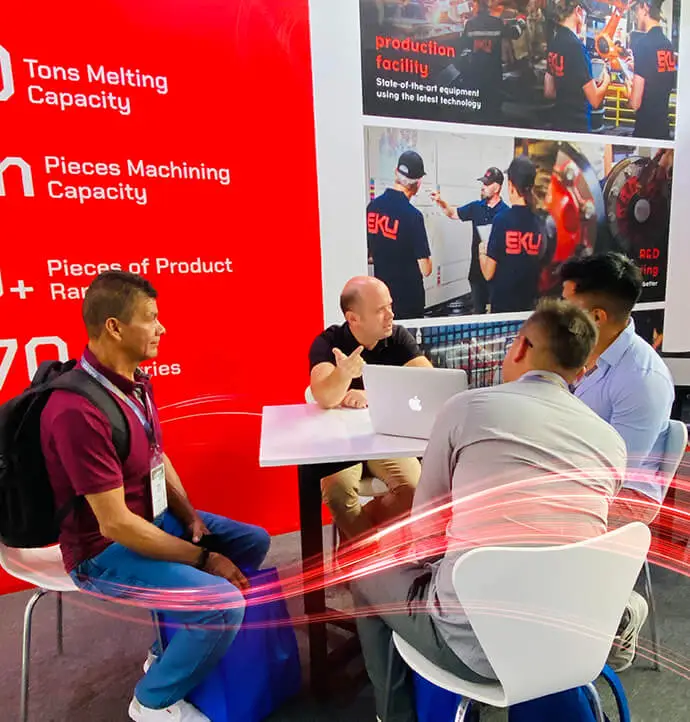One of Us Dr. Mehmet Dudaroğlu

One of the leading names in the Turkish Metal Casting Industry, EKU Brake and the Chairman of the Board of Directors of Automotive Supply Industry Specialized Organized Industrial Zone (TOSB), Dr. Mehmet Dudaroğlu was hosted at Türkdöküm.
Mr. Mehmet, we would like to start our interview with the metal casting industry. Casting is a deep-rooted industry with a historical background. We can say that "innovation and progress" is the way of production in the industry. Considering that the history of the modern casting industry in Turkey started in the 1970s, how would you evaluate this 50-year development?
While the Turkish Metal Casting Industry continues its development journey, which started in the 1970s, by researching, learning, experimenting and implementing, the modernization of our country accelerates with its opening to the world in the 1980s. Turkey adopts the policy of growth through exports and encourages industrialists to become exporters. On the one hand, industrialization is developed through Organized Industrial Zones (today, around 50 percent of production is carried out in OIZs), while on the other hand, special industrial zones are created with the "Clustering Model". In 2009, with the support of the European Union project, the infrastructure work for the "Foundry Cluster" in Konya is recognized as a good example.
Incentives for investments and R&D activities accelerate the transition to modern industrialism in parallel with regional development. The sector's opening to export markets also improves its ability to do international business. Technological developments are followed and brought to the country, and the character of labor-intensive production begins to evolve to a technology-intensive position. With the capacity increase, quality improvements, customer satisfaction and just-in-time delivery approach, the Turkish Metal Casting Sector is reaching a level that is appreciated worldwide.
In this 50-year period, our industry has faced many challenges and crises, but has always managed to survive and achieve sustainable growth. According to 2022 figures, our industry is the 9th largest casting producer in the world and the 2nd largest in Europe. What do you think is the secret of sustainable success?
According to the report published by TÜDOKSAD, the Turkish Metal Casting sector has reached an annual production figure of 3.1 million tons in 2022 with a growth rate of 4.9 percent. Going from 200 thousand tons of annual production in the 1970s to these levels shows the dynamism of the sector. Since the 1970s, our country has experienced many economic crises. We industrialists have learned important lessons from these crises and strengthened our immune system and competitiveness. Foundry, one of the oldest and most established fields of industry, produces intermediate goods for many branches of industry and is of great importance for our country's economy.
The automotive, construction and machinery sectors have been the driving force in the development of Turkish metal foundry. Government supports, geographical location, foundries closing in Europe, China's distance from the market and European main automotive manufacturers turning to Turkey for parts supply are great advantages for the sector. For the Turkish Metal Casting Industry, which is integrated into the world with its ability to easily access developed export markets, innovation and growth is the right strategy for sustainable success. I believe that the determination of the foundry industrialists, their ambition for success and their love for the country are the driving force for the realization of this strategy. I believe that with the updated European Union Customs Legislation, Free Trade Agreements, single digit inflation, predictable exchange rate and sustainable investment environment, the Turkish Metal Casting Industry will rise to the top of the world rankings.

We left the Covid-19 Pandemic behind. With the pandemic, the most talked about topic in production is digitalization, how do you see digitalization in the foundry sector? Will digitalization be effective when you consider the foundry processes?
The pandemic broke the world supply chain, disrupted mobility, halted production, and caused human losses. The process took longer than expected. With the pandemic, we learned to use instruments such as flexible production and remote access. Even though we use all technological opportunities, manufacturing is done in the field, and real-time data is needed to control the field. Using automation and robotic systems efficiently requires a separate skill.
It is generally accepted that the total equipment effectiveness (OEE) level in a production cell equipped with a robotic system should be around 60 percent. To increase this level, it is necessary to make improvements in the production operation steps and eliminate losses. To do all this, real-time data from the field must be collected, evaluated and actions taken. Data collected in real time is needed to eliminate small stoppages, reduce set-up times to single digits, increase the value-added work in the production operation cycle to at least 25 percent, ensure product traceability, control waste, ensure the healthy operation of machinery and equipment, autonomous maintenance, preventive maintenance, planned maintenance, energy efficiency, production efficiency.
Through the Industrial Internet of Things (IIoT), data can be collected in real time from machinery and equipment in the field. This data is transferred to the Production Management System (MES) and plays an important role in effective production planning, eliminating waiting times and thus increasing production efficiency. Through the industrial internet of things, the performance of machine equipment can be increased, preventive maintenance can be carried out proactively and malfunctioning downtime can be prevented. Sand mold quality and core mold quality can be monitored by high-resolution cameras. Similarly, casting defects can be detected by digital cameras. It is now possible to monitor ladle wear with laser optical devices and to monitor the thermal load on the induction coil. The ability to read QR codes for product traceability by cameras is an important development for mass production. To have smart factories in our industry, digitalization is a must.
As someone well-acquainted with the European casting sector, how do you view the strengths and weaknesses of the Turkish metal casting industry?
Our strengths include;
-
Strong and modern facilities with robust production capacity,
-
Possession of internationally accredited quality certifications,
-
Sufficient geographical distribution,
-
Young and skilled workforce,
-
Competence in international business practices,
-
Resilience in the face of crises.
Our weaknesses can be listed as "Insufficiency of R&D activities, Insufficiency of domestic raw material production, Weakness of capital structure, Automotive-dominated market structure, High labor, raw material and energy costs, High investment financing costs and difficulties in accessibility, Lack of vocational mid-level labor force training".

If we open a separate parenthesis for the automotive sector, how should the foundry industry read the developments in the sector?
The growth of the automotive industry plays an important role in the growth of the metal casting industry. Automotive is one of the most important markets for the metal casting industry. In recent years, there has been a serious decline in world automotive production. During the pandemic period, the decline in production reached the highest level with the breakdown of the supply chain and the chip crisis. Organizations in the metal casting sector that produce automotive parts have felt this process.
Zero emission, carbon footprint and renewable energy issues are also on the main agenda of the automotive industry. With the increase in the production of electric vehicles, it is inevitable that the production numbers of many parts used in internal combustion engine vehicles will decrease. Many parts will not be produced in parallel with the development. With the goal of zero emissions, the automotive industry is turning towards lightweight parts with high durability. To meet these demands, R&D and innovation efforts are inevitable. The metal casting industry should prepare itself by closely following these developments. I believe that the risk of an automotive-dominated market structure should be distributed by turning to other sectors. The metal foundry sector is an energy-intensive sector and should complete renewable energy investments to meet its own consumption in a short time. Efforts should be accelerated by setting realistic targets for emission reduction.
Looking at macroeconomic developments, what are your general expectations for Turkey and the world economy for 2023?
The world is going through a period of recession. The war in Russia and Ukraine, which is the source of raw materials for our industry, continues to have an aggravating effect on economic conditions. Energy and input costs are becoming more difficult to manage. The world economy is still recovering from the pandemic. While the supply chain is just beginning to recover, the Sino-US economic war is making conditions even more difficult. Covert and overt embargoes are causing disruptions in the business world and delays in production and delivery.
Turkey is trying to overcome the economic bottleneck it is in. For industrialists, it is very important to have manageable input costs, continuity of production and sales, profitability, easy access to financing sources, a sustainable investment environment and a competent workforce. Any deterioration in these areas starts to put the business world in difficulty, and we have experienced these difficulties in the past. I believe that we will overcome this difficult period with the dynamism and experience in our sector.
In this part of our interview, we would like to talk about EKU Brake. How did EKU, which produces for both international and domestic markets, spend 2022 in terms of production and investment, and how does 2023 continue?
We left behind a successful year in terms of production and sales. 90 percent of production is exported. We rose from 587 to 467 in the Turkish Exporters' Associations Top 1000 Exporter Companies ranking, and from 59 to 43 in the Automotive Exporter Companies ranking. We work in three shifts. In 2023, despite the expectation of recession in developed countries, our sales continue successfully. We anticipate that we will meet our budget targets in the second half as we did in the first half.
As an organization exporting to 100 countries, how is EKU Brake preparing for the coming period? Your investments and targets.
We completed the capacity investment technical feasibility during the pandemic process. We started our foundry and machining investment in the last quarter of 2022. With our investment to be completed in 2024, we will increase our production capacity by 200 percent. We will realize our goal of becoming a "Smart Factory" with the digitalization efforts we have initiated. We are continuing our renewable energy investment efforts for self-consumption, and we will realize this by 2025. With the new investment, we aim to continue growing in existing and new markets as Europe's largest heavy commercial brake drum and brake disc manufacturer.
Mr. Mehmet, you have taken and continue to take part in many non-governmental organizations related to your field of business in Turkey, you are a well-known person in the sector, but we would still like to introduce you to our readers. Could you tell us about when and where you were born, your family life and your educational career?
Born in 1956 in Artvin, I am from Hopa. I graduated from the Department of Chemical Engineering at Karadeniz Technical University in 1976. In the following years, I continued my higher education in Turkey and abroad. I completed my Business Foreign Trade education abroad, my Finance-based MBA and my Doctorate in Business Administration in parallel with my working life in Turkey. I started my business life at Karabük Iron and Steel Factory and continued as a chief manufacturing engineer in the pharmaceutical industry. After 10 years of professional working life, I started working at EKU Brake on September 5, 1986.
I got to know our two distinguished sectoral associations TÜDÖKSAD and TAYSAD, which are the most prestigious non-governmental organizations in my opinion, simultaneously. Since our company produces 100 percent automotive parts, I started to closely follow the activities of TAYSAD and joined its activities after a short time. During my period as a Board Member and Chairman, I brought many of our foundry companies to TAYSAD. I served as the Chairman of the TOBB Automotive Supply Industry Assembly for a period. I am a member of the Gebze Technical University Foundation enterprising committee. I am a founding member of TAIDER. I served on the Board of Directors of the Association of Vehicle Supply Industrialists (TAYSAD) for 14 years, the last four of which were as chairman.
I have been involved in the preparation of reports on the development of the supply industry, sectoral problems and solution proposals, preparation of the Supply Industry Strategy Roadmap, bringing together domestic and foreign main industry companies and our industrialists, inclusion of Turquality incentives in the scope of the supply industry, establishment of the Training Committee, R&D center structuring, launching aftermarket conferences, establishment of the Maintenance and Repair Committee, launching maintenance and repair conferences, creating the brand value of the supply industry, and supporting the realization of domestic brand automotive production.
I am serving as the Chairman of the Board of Directors of the Automotive Supply Industry Specialized Organized Industrial Zone (TOSB) for the second term. TOSB is the only OIZ in the world with 79 members, founded by four members of TAYSAD management. It is an exemplary clustering model as a specialized OIZ.
What influenced you to choose the casting profession?
After my education abroad, I returned to Turkey in 1986. I established a foreign trade company and started exporting. For EKU Brake and Casting Industry, we determined the strategy of "Growth through exports". After 7 months of work, I exported the first brake drum from Turkey to Germany. Shortly afterwards, I started exporting brake drums to other European and Middle Eastern countries. With exports, production increase, investments, technology transfer, growth in different markets, I found myself in the metal casting world for the second time after Karabük Demir Çelik.
We would like to listen to the story of the establishment of EKU Brake and the important milestones since its establishment?
EKU Brake was founded in Karabük in 1962 by Rahmi Küçük to produce brake drums for heavy commercial vehicles. The brake drums were produced in the foundry using hand molds and cupola metal melting furnaces, processed on universal machines in the machining workshop and offered for sale.
The company moved to Kartal, Istanbul in 1967. It soon became the sole supplier of Mercedes, MAN and Chrysler main industry companies.
-
1981 The first induction metal melting furnace is commissioned. Metal melting capacity is 21 tons/hour.
-
1987 The first brake drum export from Turkey is made to Germany. Currently, exports are made to 100 countries.
-
1988 The first CNC vertical lathe was imported. Currently there are 60 CNC vertical lathes and drilling machines.
-
1993 The first automatic molding line was commissioned at the end of 1993.
-
1996 The first Collective Labor Agreement was signed with Özçelik-iş union.
-
2000 Exports to Canada and America started.
-
2002 Started production of brake discs for heavy commercial vehicles.
-
2003 Moved to its facilities in TOSB Organized Industrial Zone, built on 50 thousand square meters with a closed area of 35 thousand square meters.
-
2006 The second automatic molding line was commissioned.
-
2007 Started manufacturing and exporting railway brake discs.
-
2010 Management restructuring completed.
-
2012 EKU Strategy Roadmap was prepared.
-
2015 Entered the Turquality Brand Support Program.
-
2017 Professional restructuring completed and Productive Management Model implementation started. -2022 Capacity increase investment initiated.
What do you do outside of work? What would you like to say about your hobbies and special interests?
Doing sports, reading books, traveling.
What would you recommend to the young generation of industrialists to be successful in their lives?
I believe that our young people will be successful if they develop the competencies I have listed below; Being able to express yourself well, a good education and a good foreign language, goal orientation, business follow-up, updating with information, following foreign publications, effective time management, ethical values, duty in sectoral associations, sports and balanced nutrition for a healthy life.
Share on Social Media !
You might also like

We Attended Expo Transporte Anpact 2022.
We came together with our important business partners in the America continent at Expo Transporte Anpact 2022.
More Information-1663771275.webp)
We Were at the Automechanika Frankfurt 2022
We took our place at Automechanika Frankfurt 2022, the world's leading trade fair for the automotive industry.
More Information
